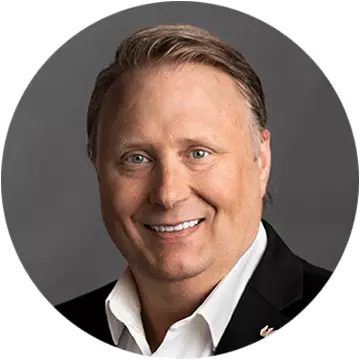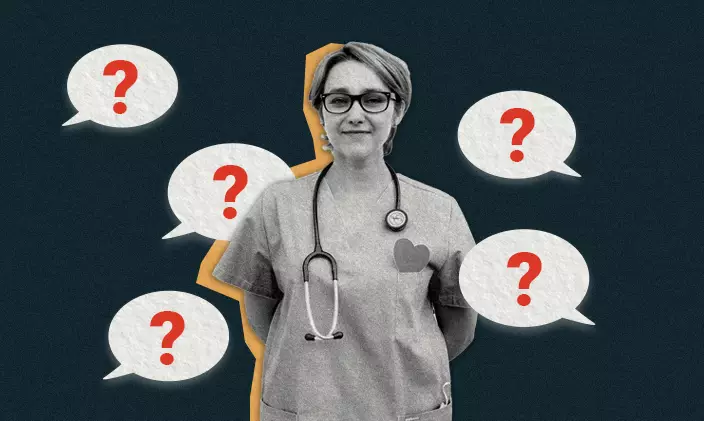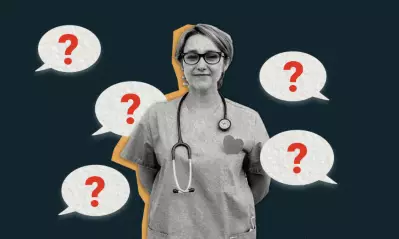Articles > Healthcare > Common healthcare interview questions and answers
Common healthcare interview questions and answers
This article was updated on March 18, 2024.

Written by Michael Feder

Reviewed by Mark Jóhannsson, DHSc, MPH, Dean, College of Health Professions

Listen to article
The healthcare sector is one of the fastest-growing industries . As a result, knowing how to prepare for healthcare interview questions is essential. Whether you’re a student looking into online healthcare degrees or a professional seeking a career change, there are typically some common lines of questioning you can expect during a job interview. To develop potential answers, here’s what you need to know about each question.
The importance of preparing for healthcare interview questions
Preparing for a job interview by studying common healthcare interview questions and answers is a necessity in today’s competitive healthcare environment. It takes a skilled healthcare professional who has a strong working knowledge of the field to stand out from the crowd.
Healthcare hiring managers will likely ask challenging interview questions, so it’s important to prepare ahead of time and anticipate situations where you may have to think of an answer on the spot.
Interviewers might ask you behavioral questions, such as providing examples of accomplishments. One effective way of handling such questions is the STAR method. STAR stands for:
- Situation: Think about a challenging situation you’ve faced.
- Task: Identify what you set out to accomplish and one or two specific skills the task required.
- Action: List actions you took and include whether you worked alone or with others.
- Result: Document quantifiable results that can show growth or measurable contributions when possible.
By adequately preparing for an interview, you can better accomplish the following:
- Easily demonstrate necessary healthcare skills, personality traits and professional values for the position
- Clearly communicate your background in healthcare industry standards
- Answer questions with ease and accuracy
- Reduce your anxiety by demonstrating a calm and poised demeanor suited to the healthcare field
- Exude confidence
Since preparation is key, here are 12 common healthcare interview questions you can, with a little practice, be ready to answer confidently and accurately.
1. Tell me about yourself
Admittedly, this is a prompt, not a question. But this traditional go-to conversation starter helps the interviewer understand why you’re a good fit for the position. It can be difficult to answer, as it usually requires a thorough explanation with specific examples of experiences and achievements.
How to answer
A hiring manager wants to hear about your strengths and how they align with the job. Therefore, you must highlight specific examples from experiences that illustrate how your skills would benefit the role.
You can keep your answer professional yet personable by:
- Focusing on your passion for healthcare
- Highlighting specific reasons why you’re interested in the healthcare industry
- Using examples of how you have demonstrated healthcare-related skills
No matter what you say, keep your answer sincere and focused.
Sample answer: “I’ve always had a calling to help people. That’s why I volunteered with a local community clinic in high school. Since then, my commitment to healthcare has only increased as I have worked in various healthcare-related positions within the nonprofit sector. Now that I am looking for another opportunity, I’m excited to explore your organization and how my skills would be a great fit for the role.”
2. What drew you to a career in healthcare?
Be honest and confident when answering this question. This helps the hiring manager assess your interest and passion for the industry and role.
Healthcare organizations often attract people who are looking for more than just a job. Speak to the authentic ways you care about the mission and vision of the clinic, hospital or organization and want to enhance the industry.
How to answer
Demonstrate your knowledge of the healthcare organization by identifying goals you may have in common with the employer. It’s important to be genuine in your responses, so avoid surface-level answers. You can do this by:
- Highlighting qualities of the organization that you value
- Discussing specific reasons why you want to work for this particular employer
- Expressing your passion for healthcare and how it has inspired you to find the right career path
Sample answer: “I’ve always wanted to work with an organization that prioritizes patient care. From my research and conversations with other industry professionals, I know your company also prioritizes high-quality care and patient satisfaction. With a constantly evolving industry in need of talented professionals to help shape change, I’m excited to contribute within this role.”
3. What is your biggest strength?
This question seems simple enough to answer, but it can be deceptively challenging.
First, focus on your professional strengths and attributes — not personal ones. In addition, try to avoid leaning heavily on common strengths within the healthcare community, such as organizational skills and punctuality. These skills are often mandatory within any role in the industry and may not set you apart from other candidates.
How to answer
You want the hiring manager to see you as a qualified healthcare professional who can contribute to the organization. To do this, emphasize strengths that are transferable among healthcare environments.
For example, if you have healthcare experience in clinical settings, highlight how great you are at managing your time and prioritizing projects. You can also discuss healthcare-related skills and qualities such as empathy and problem-solving.
Sample answer: “One of my biggest strengths is my ability to empathize. This helps me to see different perspectives and arrive at solutions that are a win-win for everyone. In an increasingly diverse society, this is an important skill for maximizing positive outcomes in the healthcare setting.”
4. What is your biggest weakness?
While there is no “correct” answer here, it’s crucial to indicate your self-awareness and offer a sincere explanation for what the interviewer may perceive as a potential weakness. Be sure to end your answer with the ways you’re addressing your weakness and how you hope to change it in the future. Trying to indicate you’ve already solved it is both unbelievable and an unrealistic answer.
How to answer
Relate your answer to the industry itself. For example, rather than pointing out a personal weakness (e.g., emotional eating when stressed), focus on an industry-related weakness such as overcommitting. Healthcare employees often have a lot of tasks, and highlighting this underscores your role as a healthcare professional with experience in a high-stress environment.
Another example of a healthcare-related weakness is an inability to multitask well. Healthcare professionals must juggle many tasks at once, and not being able to do so efficiently can lead to errors. If you have healthcare experience in clinical settings, highlight how professionals must focus on patient safety and best practices to keep patients healthy.
Sample answer: “I’m a perfectionist, which affects my ability to delegate tasks and let go. While it’s something that has worked to my advantage at times, I know it can be a weakness as healthcare professionals are required to multitask and prioritize tasks. However, I am working on improving this by utilizing some of my time-management skills I discussed earlier.”
How to prepare for a successful interview
Even the bravest person can get nervous before an interview! For more tips, read our Interview Guide , which includes additional interview guidance.
5. How do you see the future of healthcare?
This question aims to identify how you can contribute to an organization and connect your healthcare career goals with the organization’s objectives. You can choose to discuss innovations or industry challenges. However, it’s important to select one and stay away from discussing both simultaneously.
How to answer
First, research the company thoroughly and understand its healthcare initiatives in addition to changes that could impact the industry as a whole.
Next, consider the community you serve. It’s important to be aware of current events in your community as they might relate to healthcare and you can potentially incorporate that knowledge into your response.
Then, demonstrate your understanding of a healthcare environment by sharing your thoughts about recent developments and how they might affect the future of healthcare. For example, if you’re looking for a job in research, talk about specific trends and how clinicians may enhance outcomes by conducting studies.
Finally, emphasize how you would contribute to industry changes that positively influence healthcare in your community.
Sample answer: “As industry experts, we are often encouraged to stay up to date with the latest healthcare initiatives. I anticipate healthcare organizations will play an integral role in delivering healthcare by focusing on patient satisfaction and providing resources through diverse technologies.”
6. How do you stay informed on current events and advancements in healthcare?
Just as with question No. 5, this one presents an opportunity to highlight your knowledge and awareness of healthcare advancements and issues.
How to answer
It’s important to not shrug off this healthcare-related question, as it may make you seem out of touch with recent developments or emerging trends in patient care.
Instead, try to speak specifically about healthcare advancements and issues you follow or understand. If anything, you can turn industry trends into your interview edge.
Describe healthcare-related magazines, journals and programs that you follow in addition to any other related news outlets. Industry publications and websites like Nurse.org or Modern Healthcare
are excellent places to start.
Sample answer: “I like to read healthcare blogs with updated information and industry news. I am also a member of healthcare organizations and affiliate groups on LinkedIn®, which has helped me stay up to date with the latest healthcare advancements.”
7. What drew you to our company in particular?
Employers typically ask this question to see what motivates you and how you would fit in as an employee of the healthcare organization.
When answering questions about your motivation, it’s usually a good idea to demonstrate both dedication and desire, especially if the organization in question has a specific focus, like pediatrics or research. During the interview, you must connect your motivation for healthcare advancement and research so hiring managers know you share their vision and understand what drives their company’s mission.
How to answer
While it may be tempting to give a generic answer, questions like this require you to dig deeper and show the interviewer what motivates your career choice. You should also focus on what makes this specific employer stand out among healthcare organizations or clinics.
Sample answer: “I chose healthcare as a profession because I’ve always been curious about healthcare and how it impacts people at their most vulnerable times. I want to make healthcare more accessible and convenient for those who truly need it, and what motivates me most is providing compassionate care to kids and families. Your company is well known for the standards of care that you hold employees to.”
8. How do you handle difficult or scared patients?
While questions like this may seem simple, your response can reveal your level of professionalism in sensitive situations.
How to answer
Regardless of how difficult patients can be, healthcare professionals must remain calm and patient when dealing with others’ healthcare concerns and reactions.
The best answer is one that demonstrates your ability to be empathic and understanding of concerns while defusing any tension. You could tell the interview about how you make strong, supportive connections with patients, such as asking them, “Can I get you anything else or answer any questions?” Explain how you create a mutually respectful foundation.
Sample answer: “I understand healthcare is often a sensitive topic for many people, so I am careful about how I approach patients and their questions or concerns. However, I always ensure my patients’ needs are met to the best of my abilities. Overall, I have learned to take a second and step back in order to understand what a given issue might be. By doing this instead of jumping into action, I’m able to deliver better care.”
9. How do you communicate bad news to patients and their families?
A question like this checks your interpersonal skills and ability to deliver healthcare information professionally.
The best answers center on empathy and understanding of how healthcare-related situations might affect patients, family members and other loved ones. In addition, the interviewer will be looking for your ability to support patients through their decisions.
How to answer
It’s important to show empathy for healthcare patients and their families while communicating delicate news transparently and ethically. It’s also an excellent opportunity to highlight your interpersonal skills, including maintaining communication with patients.
Sample answer: “I focus on gathering all the correct clinical information to be ready to answer any questions. During the meeting, I introduce myself and verify how the patient prefers to talk, and whether they’d prefer if their relatives stayed. Next, I offer sincere apologies if needed, and explain the healthcare situation in easily understandable terms. If I’m able to connect the patient with other resources, I share those. Finally, I always offer an opportunity for questions and answers before leaving the room.”
10. What makes you stand out as a healthcare practitioner?
This question can potentially reveal whether a candidate has skills and experiences that fit the role or fill an unmet need for the organization. The answer can also demonstrate a candidate’s forward thinking about the industry and how this would benefit the company in a rapidly changing environment. This question is an opportunity for candidates to differentiate themselves from other applicants.
You should demonstrate your ability to think critically, acknowledge what makes you an asset to healthcare organizations and communicate how your skills would benefit the company.
It’s also worthwhile to highlight your flexibility. If you’re new to the field, you may be expected to work weekends, holidays or nights, depending on the role. Acknowledge your willingness to do this if necessary.
How to answer
Focus on your unique strengths and experiences and how they could benefit the healthcare company. Explain how these unique attributes can address a need within the organization. For example, if they have patient population or staffing concerns, talk about how your unique strengths would help the organization better address trends in the industry. Tailoring the answer to specific challenges faced by the organization demonstrates you’ve done your homework about their organization and can add value to their team.
Focus on your strengths and how they meet or exceed employer expectations. You must learn about the healthcare company to provide an answer that will encourage your interviewer to hire you. An excellent way to begin is to speak about the organization’s vision and goals.
Sample answer: “I am confident I can add value to this organization through my highly developed skills and experience. I’m excited about this opportunity because of the organization’s strong focus on empathy and patient care. In addition, my previous experience with ABC Clinic has taught me valuable communication, time-management and decision-making skills. I feel confident I can positively contribute to this healthcare organization.”
11. What are your career goals?
Some healthcare organizations value a desire to achieve specific healthcare goals and long-term plans, and they look for ways to help their employees achieve them. Most of the time, this question is designed to gauge your motivations and whether you’re a goal-oriented person.
How to answer
It’s critical to demonstrate your enthusiasm for healthcare and, in particular, the prospect of progressing in your field. There is no need to go into detail about your life plan. Instead, concentrate on the short term, and discuss how the employer would fit your objectives.
Sample answer: “My short-term goal is to secure a position as a physician assistant. Ultimately, I’d like to further my career by working for a company such as this one in the capacity of an administrator overseeing healthcare operations.”
12. Describe a time you went above and beyond for a patient
Hiring managers want employees with a keen sense of responsibility and dedication. So even if you’re new to the industry, highlight a healthcare-related experience that shows you’re capable of exceeding expectations.
How to answer
Highlight a specific situation where you went above and beyond, such as taking the lead in an emergency or returning to work after hours. Additionally, discuss how your work has positively influenced a patient and how you accomplished your duties.
Sample answer: “We had a patient who experienced chest pain and arrived at the emergency room without identifying any medical history. I stayed after my shift to gather more information, including calling her family members for medical history. In being diligent with my research, I was able to identify potential healthcare concerns.”
Healthcare interview tips
In addition to carefully considering upcoming interview questions, it’s important to prepare for any job interview with the following tips:
- Dress appropriately
- Make sure to maintain eye contact and give firm handshakes
- Pose thoughtful questions
- Make yourself memorable to hiring managers
- Take notes when appropriate
- Make sure lighting is adequate and your frame is free of distractions for virtual interviews
- Be enthusiastic and friendly
- Research an organization before any job interview
- Practice your answers with a friend
- Reread the job description
- Arrive early (for in-person or virtual interviews)
- Make sure your computer and systems work before virtual interviews
- Bring multiple copies of your resumé
- Follow up with a thank-you note
These tips will help you formulate better answers and interview skills. Moreover, healthcare job seekers who can master the art of an interview will be ready for the next opportunity that comes their way.
Ready to tackle those healthcare interview questions?
Whether you’re studying up on healthcare interview questions because you're transitioning to a healthcare career from another industry, or seeking an entry-level healthcare position
after completing your online degree, University of Phoenix students and graduates have access to free career tools and resources for life
. Learn how to navigate your career plan and discover open positions based on your unique skills, program and more with the following resources:
- Career Services for Life
®: Available to UOPX students and graduates, this offering comprises complimentary career coaching, including guidance on how to build a personal brand and write a resumé.
- Free career resources
: Browse a range of downloadable guides and templates to help you optimize your LinkedIn® profile, get ready for a job interview and write a resumé and cover letter.
- Career With Confidence® newsletter
: Get career insights every week via UOPX’s LinkedIn newsletter.
LinkedIn is a registered trademark of LinkedIn Corporation and its affiliates in the United States and/or other countries.

ABOUT THE AUTHOR
A graduate of Johns Hopkins University and its Writing Seminars program and winner of the Stephen A. Dixon Literary Prize, Michael Feder brings an eye for detail and a passion for research to every article he writes. His academic and professional background includes experience in marketing, content development, script writing and SEO. Today, he works as a multimedia specialist at University of Phoenix where he covers a variety of topics ranging from healthcare to IT.

ABOUT THE REVIEWER
Mark Jóhannsson is the Dean of the College of Health Professions. He has a career spanning over 35 years of healthcare management, public health practice, higher education administration, teaching and clinical/behavioral research within corporate, community and academic settings. He has served as both an educational and keynote speaker, and he has been published in a variety of peer-reviewed and periodic literature.
This article has been vetted by University of Phoenix's editorial advisory committee.
Read more about our editorial process.



